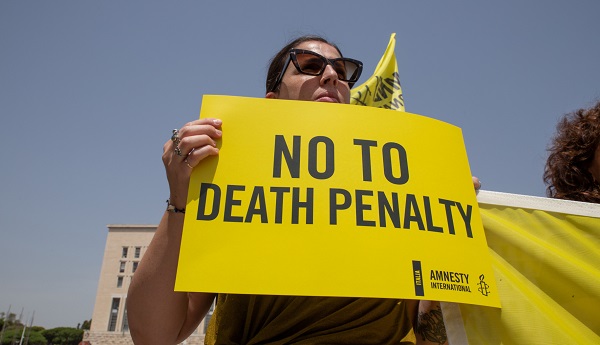 Credit: © 2022 Pacific Press
Credit: © 2022 Pacific Press
Amnesty International has reported that judicial executions recorded worldwide in 2022 reached a record level since 2017, with 20 countries having carried out executions (to Amnesty International’s knowledge), with the Middle East and North Africa as the main countries behind the record.
The organisation reported 883 people were executed in 20 countries, notably an increase of 53% compared to 2021. This surge in executions (which does not take into account the thousands more suspected to have taken place in China last year) is mainly due to countries in the Middle East and North Africa, where the recorded figures have increased from 520 in 2021 to 825 in 2022.
“Countries in the Middle East and North Africa have flouted international law by stepping up the pace of executions in 2022, showing a cruel disregard for human life […]. Saudi Arabia has gone so far as to execute 81 prisoners in a single day. In recent months, in a desperate attempt to put an end to the popular uprising, the Iranian authorities have taken the lives of people who had only exercised their right to demonstrate,” said Amnesty International Secretary General, Agnès Squid.
The secrecy surrounding the use of the death penalty still prevented the phenomenon from being accurately assessed in several countries, such as China, North Korea and Vietnam – known to use the death penalty on a massive scale – which means that the global total is significantly higher, noted Amnesty International. Although the precise number of people executed in China is unknown, the latter remained the leading country that executed the most people, ahead of Iran, Saudi Arabia, Egypt and the United States.
Executions resumed in five countries in 2022 – Afghanistan, Kuwait, Myanmar, the State of Palestine and Singapore – and they rose from the previous year in Iran (from 314 to 576), Saudi Arabia (from 65 to 196) and the United States (from eleven to eighteen).
The number of people executed in drug-related cases has more than doubled between 2021 and 2022. Executions for such offenses violate international human rights law, which permits the use of the death penalty only for the “most serious crimes” – involving intentional homicides. Executions under this reasoning were recorded in China, Saudi Arabia (57), Iran (255) and Singapore (eleven), accounting for 37% of the total number of executions worldwide. Several very probably also occurred in Vietnam, but the data relating to the application of the death penalty remained a state secret in this country.
“By a cruel whim of fate, almost 40% of the executions recorded in 2022 followed death sentences handed down for drug-related offences […] this cruel punishment often disproportionately affects people from disadvantaged backgrounds,” said Agnès Callamard. “It is time for governments and the United Nations to step up the pressure on those responsible for these gross human rights violations and ensure that international protections are in place.”
While the number of executions increased, the number of death sentences handed down during the year fell slightly, from 2,052 in 2021 to 2,016 in 2022.
Meanwhile, six countries entirely or partially abolished the death penalty during the year. Kazakhstan, Papua New Guinea, Sierra Leone and the Central African Republic abolished it for all crimes, while Equatorial Guinea and Zambia only abolished it for common crimes.
By the end of 2022, 112 countries had abolished the death penalty for all crimes, and nine only for ordinary crimes. This positive momentum continued in Liberia and Ghana, which took legislative steps towards the abolition of the death penalty, as well as in Sri Lanka and the Maldives, two countries whose authorities announced that they would no longer enforce death sentences. Bills to abolish the mandatory application of the death penalty have also been introduced in the Malaysian Parliament.
“With 125 UN Member States – a record number – calling for a moratorium on executions, Amnesty International has never been more hopeful that this despicable punishment will be consigned to the annals of history. However, the tragic numbers for 2022 remind us that we cannot rest on our laurels. We will continue to mobilise until the death penalty is abolished worldwide,” said Agnès Callamard, noting that countries like Iran, Saudi Arabia as well as China, North Korea and Vietnam are in the minority today.
Amnesty International Luxembourg told Chronicle.lu about its contribution to this global issue, noting three main areas of action. Firstly, it reported informing the general public. Secondly, it specified advocating with the Luxembourg Government and with the UN delegation “to make Luxembourg a front runner for the moratorium and to convince other countries to join the call”. Lastly, the organisation named the mobilisation of supporters and of the Luxembourg population, citing the example of petitions and digital action in the prevention and overturning of death sentences.








